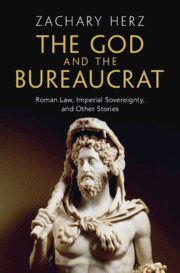
- Coming soon
- Publisher:
- Cambridge University Press
- Expected online publication date:
- September 2025
- Print publication year:
- 2025
- Online ISBN:
- 9781009629928

Why is Roman law so boring? In this book, Zachary Herz argues that the bureaucratic, positivistic world of Roman law is not a distraction from the violent autocracy of the Roman empire, but an imagined escape. Lawyers, bureaucrats, and even emperors used legal writing to think about worlds that were safer or fairer than the one in which they lived. This archive of political imagination slowly became a law-code, and now guides readers through a legal system about which its authors could only dream. From Augustus to Justinian, this book shows how law symbolized order in chaotic times, and how that symbol eventually took on a life of its own. From the enlightened judgements of Hadrian to the great jurists and child rulers of Severan Rome, Herz reveals what Romans were really talking about when they talked about law.
‘In The God and the Bureaucrat, Zachary Herz offers a powerful new vision of Roman law. Herz sees talk about law, and ultimately Roman legal literatures themselves, as a preeminent site for imagining the relationship between norms, politics and power. A richly theorized work, its close readings offer startling new perspectives on texts we thought we knew.’
Clifford Ando - University of Chicago
‘Herz's powerful and provocative book not only interrogates the stories that Romans told to themselves, but also the stories that we tell ourselves today. From Cicero to Joan Didion, by way of Ronald Dworkin and a starry roster of Roman emperors, Herz’s bold and original thesis is nothing less than an invitation to rethink the entire field of classical Roman political thought.’
Caroline Humfress - University of St Andrews and University of Michigan Law School
‘Roman law presents its readers with what at first sight appears to be a sturdy edifice for the structuring of social relations. With this penetrating book, Herz peers into its structural core to show that, far from being adamantine, the system was extraordinarily contingent and evanescent. Roman imperial law is best understood not as describing social realities, let alone constituting them by fiat. It served, rather, to construct an ideal world far beyond the realizable in response to the crises and contradictions inherent in autocracy.’
Noel Lenski - Yale University
‘Zachary Herz prompts us to rethink the dual nature of what we call ‘law’ as a particular discursive formation, which facilitated imaginative thinking in several domains, and as an institutional framework that regulated social relations and undergirded Rome's political order.’
Carlos F. Noreña - University of California, Berkeley
Usage data cannot currently be displayed.